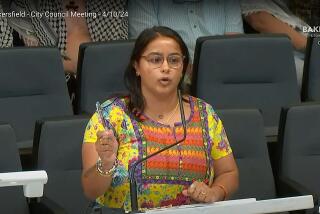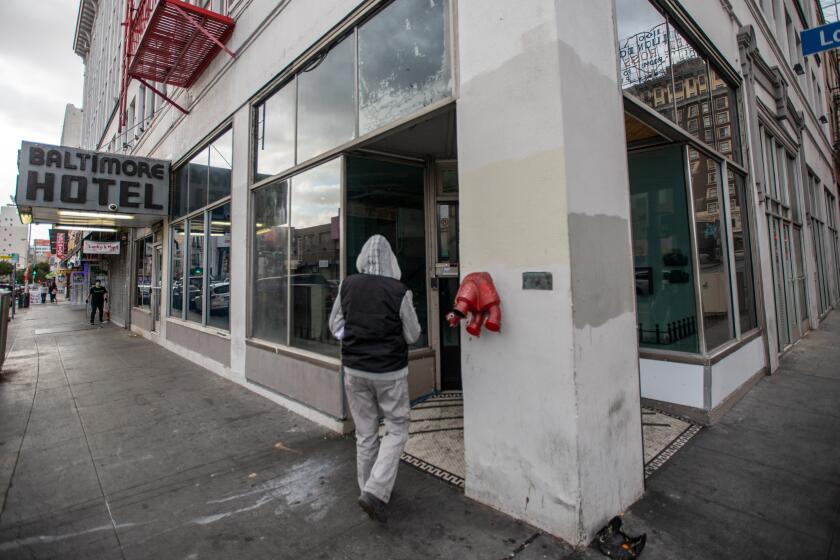East of Bell, another reason to monitor city hall
I was never particularly good at math, but as I looked through the contract of former Indio City Manager Glenn Southard, I knew his $300,000-plus salary was not the best part of his deal.
Southard didn’t start at that salary. He was hired in 2005 for $240,000 after a long stretch working for the city of Claremont. But raises seem to come more quickly for some city executives than for the rest of us, even as local services and workforces are being whacked. In 2007, Southard negotiated a new contract for $300,000, plus a nice little bonus.
That didn’t put him in the same orbit as Robert “Ratso” Rizzo, the ousted Bell city executive, but Southard was no piker. In fact, his total compensation deal was pointed out to me as an example of excess by reformers trying to rein in labor costs and pensions across California.
“City Manager shall receive a one-time lump sum bonus of ten percent (10%) upon execution of this agreement,” said Southard’s contract when it was sweetened in July 2007.
Not bad. For merely signing his name to a $300,000 contract, Southard got a $30,000 bonus in a city that’s been laying off dozens of employees because of a budget deficit.
But there’s more.
Southard’s contract called for a $50,000 life insurance policy and a second policy, for good measure, valued at $500,000. In addition to city contributions to his pension with the California Public Employees Retirement System, “City agrees to deposit the maximum sum allowed” into a separate, deferred retirement fund known as a 457. That put the city on the hook for as much as $22,000 a year more.
He was given 30 days of vacation time the day he started work, with 30 additional days (six weeks) per year. “Such vacation may be carried over, if not used, with unlimited accumulation,” said the contract, which allowed him to accept cash, instead, for up to 120 hours of vacation time each year.
In addition, the contract called for 90 days of sick leave, health insurance, a $600 monthly car allowance, 13 paid holidays and two personal days annually.
Southard, who retired on April 1 with $309,375 as his final pay, did not return my phone calls, nor did two City Council members. Earlier this year, Southard got his name in the Desert Sun, when the paper ran a scrappy expose on $805,000 in credit card expenses by city employees — though very little of it was run up by Southard — in the midst of a $9-million budget deficit.
The Sun said the expenses were for “pricey meals, travel that took staff members across the country, professional sporting events and a trip for the city manager’s wife — all on taxpayer-funded credit cards.”
When Southard retired, according to Assistant City Manager Tara Adams, he cashed out on unused vacation and sick days, bringing his five-year total for cash payouts on those extras to $162,000.
He also availed himself of a generous early-retirement incentive the city was offering that gave him credit for an extra two years of service for the purpose of figuring his retirement pay. According to Adams, that meant that Southard worked five years in Indio and got credit for seven. She did not know if his final monthly retirement pay, which he’ll collect until the day he dies, has been calculated yet.
Adams told me Southard accomplished a lot in Indio and had both supporters and detractors.
One of the latter is longtime Indio resident Barbara Barba, a retired office manager and accountant who had a bad feeling about Southard from the beginning.
The City Council “turned their authority over to him,” said Barba, who added that Southard was paid more than the vice president of the United States ($227,000) and that not enough residents watched him as closely as they should have.
Since I began writing about public employee pensions, lots of employees have pummeled me with complaints, arguing that public pensions aren’t the major cause of the state’s $20-billion budget deficit (true) and that at lower-level jobs, retirement packages aren’t as outrageous as they are for the golden parachute club (also true).
But by many assessments, we’re in trouble if retirement benefits aren’t scaled back for new hires, at the very least. And in Sacramento, Assembly Bill 1987, which was initially offered up as a way to derail the practice of pension-spiking, is now being targeted by critics who say that it will do the exact opposite in some cases because of loopholes.
Meanwhile, a Stanford study puts the state’s pension liability at a staggering $500 billion. And in Los Angeles, City Administrative Officer Miguel Santana warned last week that the cost of retirement benefits would grow from $1.4 billion in 2011 to $2.2 billion by 2015, when 20% of the city budget will pay the retirement costs of police and firefighters whose average retirement age is 51.
“We can’t sustain that,” said L.A. City Councilman Bill Rosendahl, who called for a close look at reforms, including partial conversion to a 401(k) plan for some employees, adding that big budget cuts are inevitable without some changes.
Change has come to Indio, thanks in part to Southard’s excess.
The new city manager, Dan Martinez, has a starting salary of $218,000, no $500,000 life insurance policy, half the vacation and sick leave as Southard and no option to cash out on either.
That’s a guy who got to the party just a little too late.
steve.lopez@latimes.com
More to Read
Start your day right
Sign up for Essential California for news, features and recommendations from the L.A. Times and beyond in your inbox six days a week.
You may occasionally receive promotional content from the Los Angeles Times.







